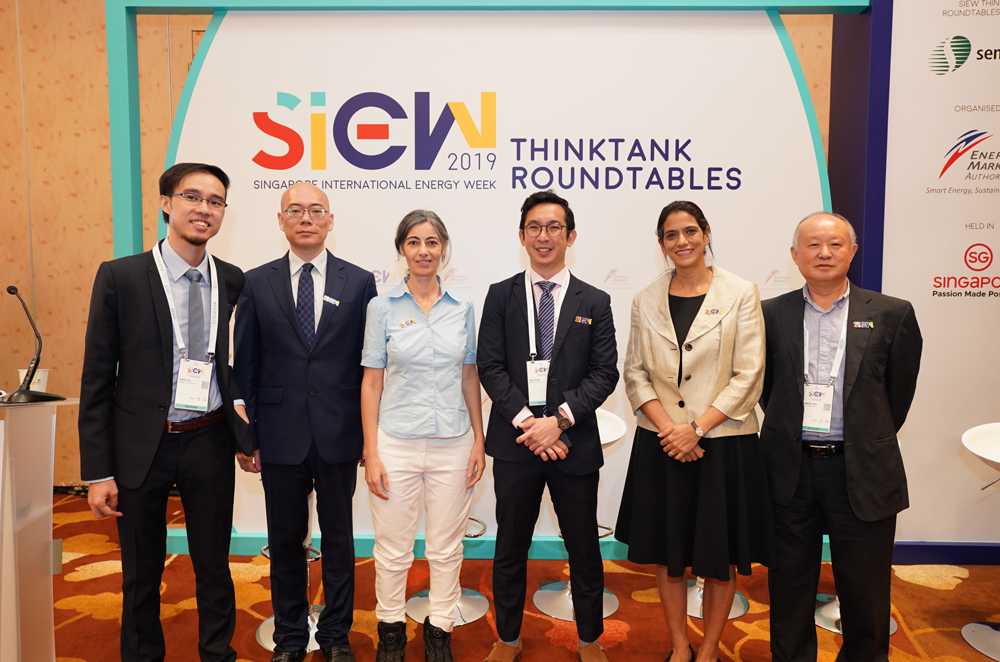Transforming the Transportation Sector through Methanol and LNG
By Jason Lee, CASS and IAGS

China's under-the-radar transportation fuel revolution was one of the key topics explored at the SIEW 2019 Roundtable B, titled "The Impact of Energy Transformation on Transport," led by the Chinese Academy of Social Sciences (CASS) and the Washington based Institute for the Analysis of Global Security (IAGS).
With air quality, energy security and economic benefit as key drivers, China has opened its transportation sector to methanol – the country is the world's largest producer of the fuel. In China, the liquid fuel is made from coal while elsewhere it is primarily produced from natural gas. Just like ethanol, which is primarily made from grain and sugar, methanol burns cleanly with practically no particulate emissions.
In China, the government has been actively promoting and testing the use of methanol in land transportation. Since 2012, methanol has been extensively tested in pure methanol internal combustion engines, as well as diesel-methanol combined combustion engines, for its fuel economy, safety, environmental friendliness, power and durability. The result was that methanol was superior or equivalent in all aspects compared to diesel engines, notably being more fuel-efficient and powerful. Due its fuel efficiency, cars running on methanol were expected to break even with gasoline cars within a year.
With these encouraging results, the Chinese government plans to scale up the use of methanol by retrofitting the engines of used vehicles, before boosting its usage in new vehicles, ships and trains, shared Professor Yao Chunde, Director of The State Key Laboratory of Engines in Tianjin University.
Professor Yao explained that in March 2019, China's Ministry of Industry and Information Technology (MIIT) led seven other government ministries in issuing a policy paper encouraging the broad commercial deployment of methanol fuelled vehicles in China. The policy followed the successful assessment of a six-year methanol vehicle pilot program spanning 24 vehicle models and 10 cities across five provinces, comprising a total driving distance of over 184 million kilometres.
Looking beyond the passenger vehicle sector, China has also turned its attention to displacing diesel. Combining combustion of methanol with diesel, Prof. Yao explained, has significant air quality benefits and enables trucks to meet China V diesel standards economically and without NOx aftertreatment.
Turning to the maritime sector Dr. Kaho Yu, senior analyst at Verisk Maplecroft, pointed out that the strict regulations on sulphur for marine fuels coming into force in the next few years are driving interest in alternative marine fuel options. Vessels using high sulfur fuel oil (HSFO) are exposed to higher regulatory risks, including liability for prosecution and fines, and may be forced to empty non-compliant fuels at port. Very low sulphur fuel oil (VLSFO) is also exposed to supply uncertainty post-2019, with scrubbers potentially facing tighter environmental restrictions. Hence, LNG is expected to expand market share post 2020, Dr. Yu noted, with an increase in the number of orders for LNG mega-container ships.
Mr. Timothy Chan of the Methanol Institute said that multi-fuel ships will become the norm and that methanol can be a practical solution for dual fuel maritime applications, along with other alternative fuels such as LPG and LNG. He highlighted the economic appeal of the fuel, viable without subsidies, and noted that it is widely available and one of the top five seaborne chemical commodities, safely handled for over 50 years.
While there have been encouraging developments with electric vehicles and shared mobility in the transportation sector, oil will remain the predominant fuel for cars. The aviation and maritime sectors will still be powered by oil for the foreseeable future, said Ms. Vandana Hari, Founder & CEO of Vanda Insights, Singapore.
Nevertheless, there were deeper considerations on the use of alternative fuels in transport. Dr. Qiang Liu, Co-chair and Secretary General of the Global Forum on Energy Security and Chinese Academy of Social Sciences, said that the source of methanol was very important from a climate change perspective. Ideally, the cleanest outcome would be to produce methanol from renewables instead of coal, as much of the methanol today was produced from coal or natural gas. If methanol was imported from other countries, it would be considered zero-carbon for the importing country.
Ms. Anne Korin, Co-Director of the Institute for the Analysis of Global Security added that climate change was just one factor in the use of alternative fuels, as it seemed that some countries and organisations were more concerned with the pollution problem from particulates, rather than from carbon emitted. In closing, Ms. Hari said that while transportation fuel was starting to get attention due to pollution and climate change concerns, more research and development efforts were needed to study fuel substitution for the marine and aviation sector.
From this robust discussion, it is clear that the transition to a cleaner future in the transportation sector will be catalysed by the increasing adoption of methanol and LNG in land, water and air transport.
